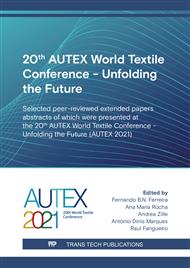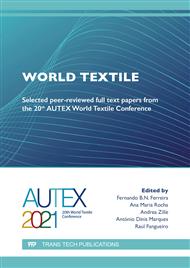[1]
A.-M. Grundmeier, Why Sustainability within the Fashion Market Needs Education. J Fashion Technol Textile Eng S3:007. (2017).
DOI: 10.4172/2329-9568.s3-007
Google Scholar
[2]
K. Fletcher, D. Williams, Fashion Education in Sustainability in Practice. RJTA Vol. 17(2), (2013) 81-88.
Google Scholar
[3]
A. Mitkov, Experimental Theory. Ruse. (2011) ISBN 978-954-712-474-5. (in Bulgarian).
Google Scholar
[4]
Fashion Revolution, A survey of EU consumer attitudes to sustainability and supply chain transparency in the fashion industry (2020). Information on: www.fashionrevolution.org [accessed 29.06.2021].
Google Scholar
[5]
McKinsey, Consumer sentiment on sustainable fashion (2020). Information on: https://www.mckinsey.com/industries/retail/our-insights/survey-consumer-sentiment-on-sustainability-in-fashion [accessed 15.07.2021].
Google Scholar
[6]
YouGov®, Grüne Mode" vs. "Fast Fashion,: Was den Deutschen beim Kleidungskauf wichtig ist. Köln. (2019) [accessed 29.06.2021]. (in German) Information on: https://d25d2506sfb94s.cloudfront.net/r/52/YouGov_Pressecharts_Gr%C3%BCne_Mode.pdf.
Google Scholar
[7]
Splendid Research (2021). Slow Fashion Monitor. Information on: https://www.splendid-research.com/de/slowfashion.html.
Google Scholar
[8]
L. Pereira, R. Carvalho, A. Dias, R. Costa, N. António, How Does Sustainability Affect Consumer Choices in the Fashion Industry? (2021) Resources, 10, 38. https://doi.org/10.3390/resources 10040038.
DOI: 10.3390/resources10040038
Google Scholar
[9]
D. Baier, T. Rausch, T. Wagner, The Drivers of Sustainable Apparel and Sportswear Consumption: A Segmented Kano Perspective. Sustainability, Vol. 12, art. 2788 (2020) 1-21.
DOI: 10.3390/su12072788
Google Scholar
[10]
D. Otto, S. Becker, E-Learning and Sustainable Development. Encyclopedia of Sustainability in Higher Education 10 (2018) 1007/978-3-319-63951-2_211-1.
Google Scholar
[11]
J.R. Corbeil, M.E. Corbeil, E-learning: past, present, and future, in: B.H. Khan, M. Ally (Eds.) International handbook of e-learning. volume 1: theoretical perspectives and research. Routhledge, New York (2015) p.51–64.
Google Scholar
[12]
C. Gunn, Sustainability factors for e-learning initiatives. ALT-J, Research in Learning Technology, Vol. 18(2) (2010) 89–103.
Google Scholar



